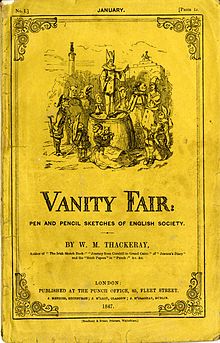
Back سوق الأضاليل Arabic Кірмаш пыхлівасьці BE-X-OLD Панаир на суетата Bulgarian ভ্যানিটি ফেয়ার (উপন্যাস) Bengali/Bangla Vanity Fair (romant) Breton Jarmark marnosti Czech Jahrmarkt der Eitelkeit German Το Πανηγύρι της Ματαιοδοξίας (μυθιστόρημα) Greek La feria de las vanidades Spanish Edevuse laat Estonian
 Title page to the first issue of the Vanity Fair 1847–1848 serial, whose canary-yellow colour became a Thackeray hallmark. Thackeray was also responsible for its illustrations. | |
| Author | William Makepeace Thackeray |
|---|---|
| Working title | Pen and Pencil Sketches of English Society |
| Illustrator | William Makepeace Thackeray |
| Language | English |
| Genre | satire, social criticism, deconstruction |
| Set in | England, Low Countries, Madras, Rhineland; 1814–1832 |
| Publisher | Punch (serialised) Bradbury and Evans (bound edition) |
Publication date | January 1847 to July 1848 (serialised in 20 parts) |
| Publication place | United Kingdom |
| Media type | |
| Pages | xvi,624 (1848 first edition) |
| OCLC | 18798256 |
| 823.8 | |
| LC Class | PR5618 .A1 |
| Preceded by | Mrs. Perkins's Ball |
| Followed by | The Book of Snobs |
| Text | Vanity Fair at Wikisource |
Vanity Fair is a novel by the English author William Makepeace Thackeray, which follows the lives of Becky Sharp and Amelia Sedley amid their friends and families during and after the Napoleonic Wars. It was first published as a 19-volume monthly serial (the last containing Parts 19 and 20) from 1847 to 1848, carrying the subtitle Pen and Pencil Sketches of English Society, which reflects both its satirisation of early 19th-century British society and the many illustrations drawn by Thackeray to accompany the text. It was published as a single volume in 1848 with the subtitle A Novel without a Hero, reflecting Thackeray's interest in deconstructing his era's conventions regarding literary heroism.[1] It is sometimes considered the "principal founder" of the Victorian domestic novel.[2]
The story is framed as a puppet play, and the narrator, despite being an authorial voice, is somewhat unreliable. The serial was a popular and critical success; the novel is now considered a classic and has inspired several audio, film, and television adaptations. It also inspired the title of the British lifestyle magazine first published in 1868, which became known for its caricatures of famous people of Victorian and Edwardian society.[3] In 2003, Vanity Fair was listed at No. 122 on the BBC's The Big Read poll of the UK's best-loved books.[4]
- ^ Faulks, Sebastian (2011), Faulks on Fiction: Great British Heroes and the Secret Life of the Novel, London: BBC Books, p. 14, ISBN 9781846079597.
- ^ Sutherland (1988), "Domestic Fiction".
- ^ Matthews, Roy T.; Mellini, Peter (1982). In 'Vanity Fair'. University of California Press. p. 17. ISBN 9780520043008.
- ^ "BBC The Big Read". BBC. April 2003. Retrieved 31 October 2012.